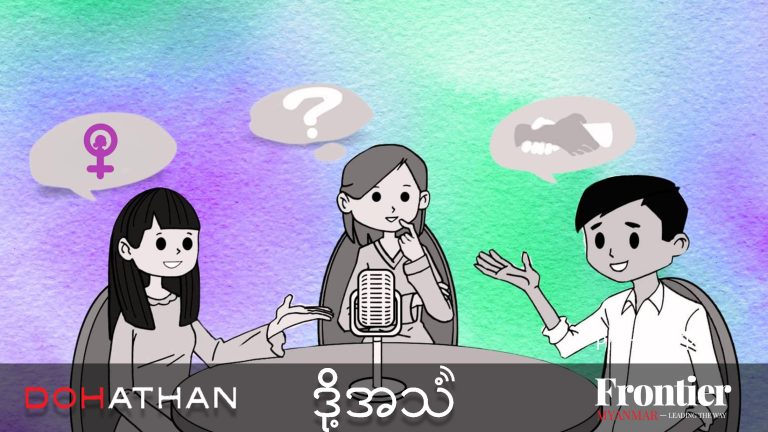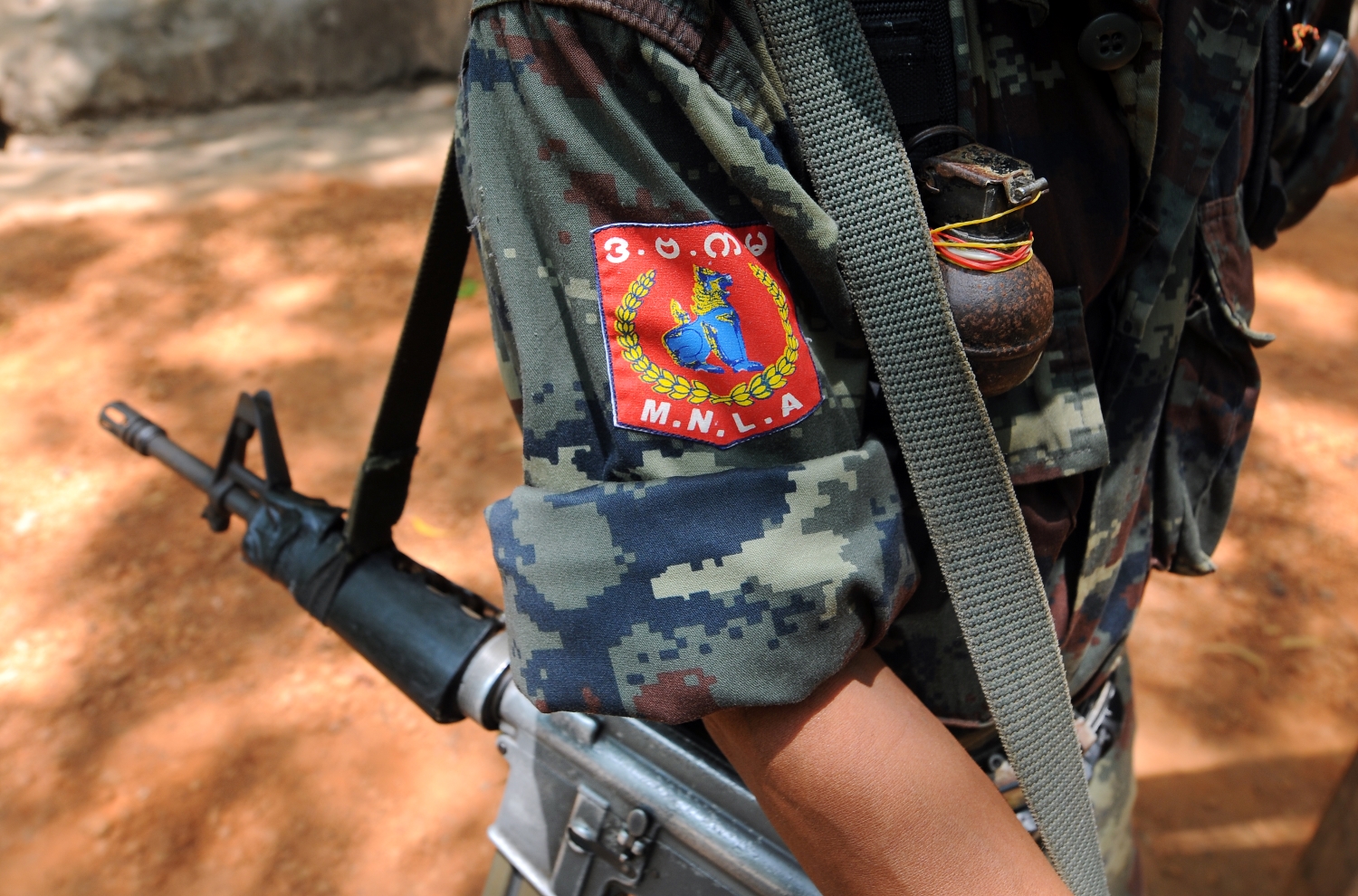An increasing number of women are devoting their lives to building a career. Do they represent a trend in women’s empowerment or is gender equality still a pervasive issue?

Daw Su Mon Htwe heads the training department at the Myanmar Media Development Center. (Ann Wang / Frontier)
Arranging to speak with the two Myanmar women featured in this report was difficult. They are busy and the demands on their time made it a challenge to schedule an interview.
They are representative of the positive changes affecting women, especially those living in cities, who have rejected a traditional stay-at-home lifestyle. Educated and independent-minded, they and others like them are leading the way for the country’s 27 million women, who account for 51 percent of the population.
Daw Su Mon Htwe’s office has a sofa, a mini-refrigerator and a cupboard full of trophies. After working as a TV anchor for seven years at MRTV4, she heads the training department at the Myanmar Media Development Center. Dressed in a pink top and a traditional htamein, with short hair and light make-up, Daw Su Mon Htwe, 31, is the women behind one of the country’s biggest media training schools. It trains about 400 students a year in video editing, TV broadcasting, voice training, script writing and other media-related subjects.
“Sometimes I cant sleep at night, I can’t stop thinking about work; it’s a lot of pressure” Daw Su Mon Htwe said, after signing documents sent in the middle of our interview. In 2008 she was asked to by a leading media entertainment company, Forever Group, to set up the training centre. She designed the curriculum, is in charge of student enrollments and is a trainer for TV-related courses, such an anchoring and production.
Support more independent journalism like this. Sign up to be a Frontier member.
Daw Su Mon Htwe admitted to having had many suitors, some with well-paying jobs, but said she preferred to remain single.
“I have to think about myself,” said Daw Su Mon Htwe, who works an eight-hour day six days a week and is studying in the evening for a diploma majoring in development studies at Yangon Institute of Economics because she doesn’t like wasting time. “When I go back home I have nothing to do, so I need to learn and I want to learn about economics and my goal is to attend an EMBA [Executive Master of Business Administration degree] course,” she said. On Sundays, her day off, she helps out in a fabric shop run in partnership with two friends.
Most of Daw Su Mon Htwe’s friends of her age are married with children, as are her sisters. She has never been pressured by her parents to marry. “My parents are really proud of me,” she said, referring to their respect for her achievements and acceptance of her single life-style. “They will never arrange a marriage for me,” she said. “It all depends on me, that’s what they told me.”
After nearly eight years in her current position, she has noticed an increase in the number of women working in the media, including at the Forever Group. Daw Su Mon Htwe believes the main reason is because the large number men who work abroad has created more job opportunities in Myanmar for women.
The census conducted last year found that an estimated 10 percent of the labour force works abroad and this is the likely reason why there are almost 1.7 million more women than men in Myanmar.

Ann Wang / Frontier
Daw Lynn Lynn Tin Htun, the founder and managing director of Mango Marketing, said there had been little incentive for women to work in the past.
“Previously, it’s not worth it for women to leave the house and work,” she said. “The money they earn cannot cover the cost of transportation and nannies; so instead of working they usually stay at home,” said Daw Lynn Lynn Tin Htun, a mother of two. “But as the country opens up, there are more corporate jobs and there are jobs that can offer higher salaries, and women are more able to join the workforce and leave the house with good hands.”
There are also more opportunities for women to be self-employed, she said. “They can be a broker, a sales person or operate a small manufacturing company at home for handcraft or souvenir or handcraft production,” said Daw Lynn Lynn Tin Htun, who had a corporate position with a foreign company for ten years before founding Mango Marketing with a woman business partner in 2004.
In terms of equal pay for men and women, Daw Lynn Lynn Tin Htun and Daw Su Mon Htwe believe they earn as much as men working at the same level. There is little data available on workplace gender equality and other issues attract more attention and funding.
“Gender equality is just as important as any issue; the studies needs to go hand in hand with the country’s development,” said Jean D’Cunha, the senior gender advisor to the United Nations Resident Coordinator.
A gender inequality report released by the UN Development Program in 2014 ranked Myanmar 150th out of 187 countries. Do the flourishing careers of Daw Su Mon Htwe and Daw Lynn Lynn Tin Htun indicate that more opportunities are becoming available for women in non-traditional roles?
“It is a small minority, perhaps, rather than being systemic of a pervasive trend,” said Dr D’Cunha.
“But this minority that is breaking out from the traditional roles could become the role models for young women in Myanmar,” she said.
“This can have a snowball effect or create a dynamic where people are beginning to question the traditional roles and reform or transform gender relationships.”
Dr D’Cunha arrived in Myanmar to take up her position in 2013, a year after the first woman was appointed to a ministerial position and three others were deputy ministers. There were also about 20 women members of the Union parliament, or about four percent of all MPs, sharply below the Asia regional average of 18 percent.
National League for Democracy leader Daw Aung San Suu Kyi has long called for more women to be represented in government and in the parliament.
Legislation approved by parliament this year has restricted women’s rights. The Interfaith Marriage Bill denies a Buddhist women the right to freely choose a life partner and the Population Control Bill gives regional governments the right to introduce family planning regulations to control birth rates.
Dr D’Cunha remains positive about the struggle for gender equality in Myanmar.
Inequality and discrimination “can always be changed with advocacy, with capacity building”, she said, adding that greater awareness would have a positive influence on those who make the law.
Dr D’Cunha believes that data demonstrating the benefits that gender equity can bring to society, in economic, social and political terms, is needed and will hopefully change mindsets.
“I’m sure the people in power today are sending their daughters to be educated abroad,” she said. “What does that mean? That is going to unleash a certain change.”

Daw Lynn Lynn Tin Htun at the “Women Empowerment Through Entrepreneurship” forum on July 20 in Yangon. (Ann Wang / Frontier)
Daw Lynn Lynn Tin Htun lost her corporate position with a foreign company because it left Myanmar as a consequence of the sanctions imposed on the country during the previous military government. Instead of returning to her family and caring for her six-month old son, she decided to launch the advertising and public relations business with a partner.
Of the 56 employees at Mango Marketing, 31 are women, all of whom are from Yangon or other big cities.
Daw Lynn Lynn Tin Htun believes that women are becoming more empowered through education and better job opportunities, but only in urban areas.
“In the rural areas it is still a challenge because the traditional mindset remains that daughters will look after the family and have no need for a good education,” she said.






